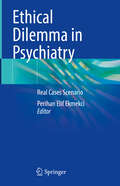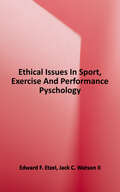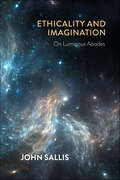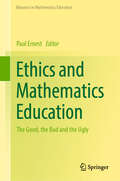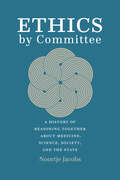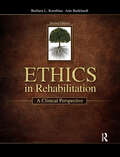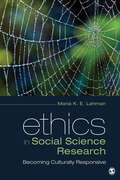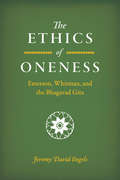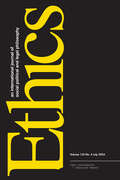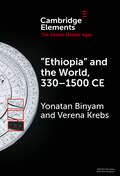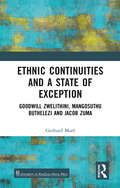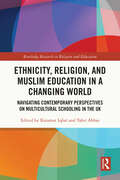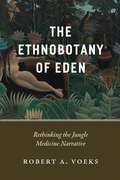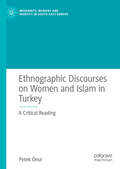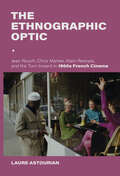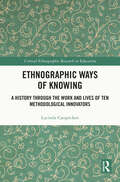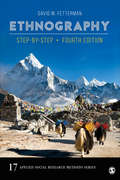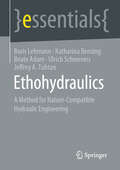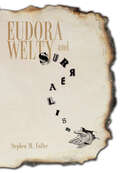- Table View
- List View
Ethical Dilemma in Psychiatry: Real Cases Scenario
by Perihan Elif EkmekciPsychiatry is a field that differs from other fields of medical practice in terms of its ethical problems and ethical dilemmas it encounters. The physicians who specialize in the field of psychiatry or health professionals who work in mental health services should be equipped to recognize these ethical problems, to deal with them in the right ethical frameworks and to offer practical and appropriate solutions in their clinical practice. The work compiles extensive experiences from Medical Faculty of Ankara University, Turkey. The book aims to give a comprehensive understanding about the particular ethical problems and dilemmas in psychiatry and provide tools and methods to approach them in an ethically appropriate way.
Ethical Issues in Sport, Exercise, and Performance Psychology
by Edward Etzel Jack C. WatsonThis book focuses attention on the range of unique ethical, legal, and related professional challenges faced by those who work in the areas of sport, exercise, and performance psychology. Ethical Issues in Sport, Exercise, and Performance Psychology is organized into four sections: ethical practices, specific populations, special settings, and academic issues. Professionals in higher education, university counseling centers, sports medicine clinics, and private practice, as well as students, will find this book an informative personal resource.
Ethicality and Imagination: On Luminous Abodes (The Collected Writings of John Sallis)
by John SallisEthicality and Imagination is the astounding conclusion to John Sallis's landmark trilogy launched with Force of Imagination and Logic of Imagination. In this new work,Sallis embarks on an unforgettable voyage spanning the cosmos and delving deep into what makes us human. If the first two works consider the question of being and thinking, respectively, the third and culminating volume takes up the question of action. In a series of highly original and always provocative meditations, Sallis articulates the way humans are rooted in their abodes yet not determined by them. Ethicality and Imagination develops a new approach to the relation of the imagination to literature, ethics, political thought, and recent discoveries in astrophysics. It represents a brilliant conclusion to one of the most exciting works of thinking in the Continental school in recent decades.
Ethics and Mathematics Education: The Good, the Bad and the Ugly (Advances in Mathematics Education)
by Paul ErnestThis edited volume is an inquiry into the ethics of mathematics education, and to a lesser extent, the ethics of mathematics. The imposition of mathematics for all raises questions of ethics. What are the ethics of teaching school mathematics? What are the costs as well as the benefits? What are the ethical issues raised by the official aims of mathematics teaching, the planned curriculum, the pedagogies employed in school and college mathematics and the assessment systems? These questions are addressed in the book as well as what systems of ethics we might use. The volume ventures into a burgeoning new field. It offers a unique set of investigations, both theoretical and in terms of practices. It announces the ethics of mathematics education as a new subfield of research and includes valuable contributions from many of the best-known researchers in mathematics education; additionally, it is a valuable resource for students, teachers and researchers in the field. This is an enduring and classic source book in the field. From the wisdom of leading scholars to the little heard voices of students, this collection offers the reader many striking new insights into the ethics of mathematics and education.
Ethics by Committee: A History of Reasoning Together about Medicine, Science, Society, and the State
by Noortje JacobsHow liberal democracies in the late twentieth century have sought to resolve public concerns over charged issues in medicine and science. Ethics boards have become obligatory passage points in today’s medical science, and we forget how novel they really are. The use of humans in experiments is an age-old practice that records show goes back to at least the third century BC, and it has been popular as a practice since the early modern period. Yet in most countries around the world, hardly any formal checks and balances existed to govern the communal oversight of experiments involving human subjects until at least the 1960s. Ethics by Committee traces the rise of ethics boards for human experimentation in the second half of the twentieth century. Using the Netherlands as a case study, historian Noortje Jacobs shows how the authority of physicians to make decisions about clinical research in this period gave way in most developed nations to formal mechanisms of communal decision-making that served to regiment the behavior of individual researchers. This historically unprecedented change in scientific governance came out of the growing international wariness of medical research in the decades after World War II and was meant to solidify a new way of reasoning together in liberal democracies about medicine and science. But what reasoning together meant, and who was invited to participate, changed drastically over time. In detailing this history, Jacobs shows that research ethics committees were originally intended not only to make human experimentation more ethical but also to raise its epistemic quality and intensify the use of new clinical research methods. By examining complex negotiations over the appropriate governance of human subjects research, Ethics by Committee is an important contribution to our understanding of the randomized controlled trial and the history of research ethics and bioethics more generally.
Ethics in Rehabilitation: A Clinical Perspective
by Ann Burkhardt Barbara KornblauEthical decision-making is a critical component in the broad spectrum of rehabilitation and health care professions today. Ethics in Rehabilitation: A Clinical Perspective, Second Edition was developed to give health and rehabilitation professionals the knowledge and tools they need to approach and solve the ethical dilemmas that challenge them in everyday practice.Following an introduction to ethical theories and principles, Drs. Kornblau and Burkhardt furnish readers with a brief overview of legal principles that may impact ethical decision making, then examine the relationship between ethical and legal principles that clinicians may encounter. The second section provides readers with an opportunity to apply what they have learned and includes more than 100 ethical dilemmas covering a wide variety of practice-related topics. Further reinforcing the concepts, the final sections consist of ethical dilemma worksheets and a set of additional learning resources to assist in the examination and resolution of ethical dilemmas.Features:• More than 100 sample ethical dilemmas extracted from actual practice experiences • Ethical dilemma worksheets to guide learning and illustrate course of action • Extensive set of appendices including sample laws and regulations • Online access to internet resources of state licensure and related lawsEthics in Rehabilitation: A Clinical Perspective, Second Edition offers readers a practical approach to ethics within a clinical context to allow practitioners, educators, and researchers to raise questions, attempt to answer them, and promote and improve ethical practice in rehabilitation.
Ethics in Social Science Research: Becoming Culturally Responsive
by Maria K. LahmanEthics in Social Science Research: Becoming Culturally Responsive provides a thorough grounding in research ethics, along with examples of real-world ethical dilemmas in working with vulnerable populations. Author Maria K. E. Lahman aims to help qualitative research students design ethically and culturally responsive research with communities that may be very different from their own. Throughout, compelling first person accounts of ethics in human research—both historical and contemporary—are highlighted and each chapter includes vignettes written by the author and her collaborators about real qualitative research projects.
Ethics in Social Science Research: Becoming Culturally Responsive
by Maria K. LahmanEthics in Social Science Research: Becoming Culturally Responsive provides a thorough grounding in research ethics, along with examples of real-world ethical dilemmas in working with vulnerable populations. Author Maria K. E. Lahman aims to help qualitative research students design ethically and culturally responsive research with communities that may be very different from their own. Throughout, compelling first person accounts of ethics in human research—both historical and contemporary—are highlighted and each chapter includes vignettes written by the author and her collaborators about real qualitative research projects.
The Ethics of Oneness: Emerson, Whitman, and the Bhagavad Gita
by Jeremy David EngelsWe live in an era defined by a sense of separation, even in the midst of networked connectivity. As cultural climates sour and divisive political structures spread, we are left wondering about our ties to each other. Consequently, there is no better time than now to reconsider ideas of unity. In The Ethics of Oneness, Jeremy David Engels reads the Bhagavad Gita alongside the works of American thinkers Ralph Waldo Emerson and Walt Whitman. Drawing on this rich combination of traditions, Engels presents the notion that individuals are fundamentally interconnected in their shared divinity. In other words, everything is one. If the lessons of oneness are taken to heart, particularly as they were expressed and celebrated by Whitman, and the ethical challenges of oneness considered seriously, Engels thinks it is possible to counter the pervasive and problematic American ideals of hierarchy, exclusion, violence, and domination.
Ethics, volume 134 number 4 (July 2024)
by EthicsThis is volume 134 issue 4 of Ethics. Ethics features scholarly work that covers a range of topics pertaining to moral, political, and legal philosophy from a variety of intellectual perspectives, including social and political theory, law, and economics. Articles in the journal present new theories, apply theory to contemporary moral issues, and focus on historical works that have significant implications for contemporary theory. In addition to major articles, Ethics publishes critical discussions, symposia, review essays, and book reviews.
‘Ethiopia’ and the World, 330–1500 CE (Elements in the Global Middle Ages)
by null Yonatan Binyam null Verena KrebsThis Cambridge Element offers an interdisciplinary introduction to the histories of the Ethiopian and Eritrean highlands from late antiquity to the late medieval period, updating traditional Western academic perspectives. Early scholarship, often by philologists and religious scholars, upheld 'Ethiopia' as an isolated repository of ancient Jewish and Christian texts. This work reframes the region's history, highlighting the political, economic, and cultural interconnections of different kingdoms, polities, and peoples. Utilizing recent advancements in Ethiopian and Eritrean Studies as well as Medieval Studies, it reevaluates key instances of contact between 'Ethiopia' and the world of Afro-Eurasia, situating the histories of the Christian, Muslim, and local-religious or 'pagan' groups living in the Red Sea littoral and the Eritrean-Ethiopian highlands in the context of the Global Middle Ages.
Ethnic Continuities and a State of Exception: Goodwill Zwelithini, Mangosuthu Buthelezi and Jacob Zuma
by Gerhard MaréThis book alerts readers to the dangers of tradition as a formal, structured politics, which enriches a narrowly elite minority while overriding democratic rights, effecting a ‘state of exception’ for the governance of millions who are rendered as ‘subjects’ in South Africa. Gerhard Maré sets his focus on three powerful men – Goodwill Zwelithini, Mangosuthu Buthelezi and Jacob Zuma – to illustrate how, from different social locations, each has relied on claims to Zulu tradition to occupy powerful and financially rewarding positions.Print edition not for sale in Sub-Saharan Africa.
Ethnicity, Religion, and Muslim Education in a Changing World: Navigating Contemporary Perspectives on Multicultural Schooling in the UK (Routledge Research in Religion and Education)
by Tahir Abbas Karamat IqbalThis novel and contemporary anthology brings important topics about race, religion, and identity to the foreground to address the challenges facing Muslim schoolchildren today.Through interviews and case studies, the chapters explore topics such as multiethnic education, teacher diversity, and culturally responsive pedagogy, providing insights into necessary changes and ways to enhance schools. Taking into account cultural touchstones such as the Black Lives Matter movement and the Trojan Horse affair, the book argues for an urgent, transformative accommodation of Muslims to take place within schooling in order to improve the educational standards of Muslim children within the United Kingdom, including several chapters that focus on Muslim education in locations such as Yorkshire, Peterborough, High Wycombe, and Tower Hamlets, and further afield.This book will be of importance to scholars, researchers, and postgraduate students studying religious education, secondary education, and multicultural education more broadly. Policymakers interested in education policy and politics, as well as race and ethnicity in educational contexts, may potentially benefit from the volume.
The Ethnobotany of Eden: Rethinking the Jungle Medicine Narrative
by Robert A. VoeksIn the mysterious and pristine forests of the tropics, a wealth of ethnobotanical panaceas and shamanic knowledge promises cures for everything from cancer and AIDS to the common cold. To access such miracles, we need only to discover and protect these medicinal treasures before they succumb to the corrosive forces of the modern world. A compelling biocultural story, certainly, and a popular perspective on the lands and peoples of equatorial latitudes—but true? Only in part. In The Ethnobotany of Eden, geographer Robert A. Voeks unravels the long lianas of history and occasional strands of truth that gave rise to this irresistible jungle medicine narrative. By exploring the interconnected worlds of anthropology, botany, and geography, Voeks shows that well-intentioned scientists and environmentalists originally crafted the jungle narrative with the primary goal of saving the world’s tropical rainforests from destruction. It was a strategy deployed to address a pressing environmental problem, one that appeared at a propitious point in history just as the Western world was taking a more globalized view of environmental issues. And yet, although supported by science and its practitioners, the story was also underpinned by a persuasive mix of myth, sentimentality, and nostalgia for a long-lost tropical Eden. Resurrecting the fascinating history of plant prospecting in the tropics, from the colonial era to the present day, The Ethnobotany of Eden rewrites with modern science the degradation narrative we’ve built up around tropical forests, revealing the entangled origins of our fables of forest cures.
Ethnographic Discourses on Women and Islam in Turkey: A Critical Reading (Modernity, Memory and Identity in South-East Europe)
by Petek OnurThis book provides a meta-reading of how ethnographic discourses on women and Islam in Turkey have changed since their emergence in 1983. It analyses the published ethnographic works in three discursive periods and shows that paradigm shifts in social sciences, processes of neo-liberal globalization and globalization of Islamism as well as political, social, cultural and economic transformations at the local level shape these periods. As an exceptional example of modernization in the Middle East and the post-imperial states in South-East Europe, Turkey has been experiencing tensions between Islamic beliefs and practices and Westernization and secularization processes. Countless aspects of Muslim women’s lives appear as symbols and indicators in this society like in many other Muslim majority societies and to scholars of gender and women’s studies in discussing the faith-based patriarchy. Thus, this book exhibits the necessity of developing a critical perspective on ethnographic representations of Muslim women in Turkey.
The Ethnographic Optic: Jean Rouch, Chris Marker, Alain Resnais, and the Turn Inward in 1960s French Cinema (New Directions in National Cinemas)
by Laure AstourianThe Ethnographic Optic traces the surprising role of ethnography in French cinema in the 1960s and examines its place in several New Wave fictions and cinéma vérité documentaries during the final years of the French colonial empire. Focusing on prominent French filmmakers Jean Rouch, Chris Marker, and Alain Resnais, author Laure Astourian elucidates their striking pivot from centering their work on distant lands to scrutinizing their own French urban culture. As awareness of the ramifications of the shrinking empire grew within metropolitan France, these filmmakers turned inward what their similarly white, urban, bourgeois predecessors had long turned outward toward the colonies: the ethnographic gaze.Featuring some of the most canonical and best-loved films of the French tradition, such as Moi, un Noir, La jetée, and Muriel, this is an essential book for readers interested in national identity and cinema.
Ethnographic Ways of Knowing: A History Through the Work and Lives of Ten Methodological Innovators (Critical Ethnographic Research in Education)
by Lucinda CarspeckenDrawing on the works of ten scholars and public intellectuals ranging over 200 years, this book foregrounds ways of knowing that include but go beyond the cognitive.The book explores the work of Harriet Martineau, Jane Addams, W. E. B. Du Bois, Zora Neale Hurston, Ella Deloria, M. N. Srinivas, Barbara Myerhoff, Orlando Fals Borda, Ronald Takaki and Nawal El Saadawi. The author discusses their multifaceted ethnographic practices and argues that such practices are still under-acknowledged in contemporary research in comparison to cognition and categorization. These scholars were outsiders to their societies in a variety of ways. They highlighted power imbalances in the perception and representation of one group by another and brought direct experience, emotion, narrative, imagination, recognition, self-reflection, activism and cultural humility into their writing, in addition to rationality. The book engages with the authors and their ideas in the context of their times and places. It also reclaims them as methodological predecessors, noting their contributions to what educational ethnography has been and what it could be in the future.Expanding the canon of social research history and providing insight into unique methodological forms, this text will be valuable for scholars and postgraduate students with interests in ethnography, as well as the history of research, anthropology and qualitative methods more broadly.
Ethnography: Step-by-Step (Applied Social Research Methods #17)
by David FettermanDavid M. Fetterman captures the ethnographic imagination with the Fourth Edition of his popular text, Ethnography: Step-by-Step. He shares new case examples of his work to highlight the illuminating power of reflexivity and theory. The new edition expands the discussion of critical concepts such as culture, contextualization, emic and etic distinctions, and symbols. The book provides insights into the use of technology in ethnography from qualitative data analysis software to data visualization, and Questions for Reflection have been added to the end of each chapter. Fetterman is a seasoned educator, evidenced by both the clarity of his thinking and the simplicity of his writing.
Ethnography: Step-by-Step (Applied Social Research Methods #17)
by David FettermanDavid M. Fetterman captures the ethnographic imagination with the Fourth Edition of his popular text, Ethnography: Step-by-Step. He shares new case examples of his work to highlight the illuminating power of reflexivity and theory. The new edition expands the discussion of critical concepts such as culture, contextualization, emic and etic distinctions, and symbols. The book provides insights into the use of technology in ethnography from qualitative data analysis software to data visualization, and Questions for Reflection have been added to the end of each chapter. Fetterman is a seasoned educator, evidenced by both the clarity of his thinking and the simplicity of his writing.
Ethohydraulics: A Method for Nature-Compatible Hydraulic Engineering (essentials)
by Beate Adam Boris Lehmann Ulrich Schwevers Katharina Bensing Jeffrey A. TuhtanEthohydraulics is the transdiscipline linking behavioural science (ethology) and flow behaviour (hydraulics). Ethohydraulic studies provide repeatable and scalable insights into the reactive behaviour of aquatic animals. The findings can be used to derive limits and guidelines as well as design specifications for the planning of hydraulic engineering facilities. In this essential book, the authors provide an overview of the fundamentals and methodological approaches of ethohydraulic investigations. In addition to real-world case studies, current developments and future advances are provided.This Springer essential is a translation of the original German 1ststedition essentials,Ethohydraulik by Boris Lehmann, published by Springer-Verlag GmbH Germany, part of Springer Nature in 2021. The translation was done with the help of artificial intelligence (machine translation by the service DeepL.com). A subsequent human revision was done primarily in terms of content, so that the book will read stylistically differently from a conventional translation. Springer Nature works continuously to further the development of tools for the production of books and on the related technologies to support the authors.
Eudora Welty and Surrealism
by Stephen M. FullerEudora Welty and Surrealism surveys Welty's fiction during the most productive period of her long writing life. The study shows how the 1930s witnessed surrealism's arrival in the United States largely through the products of its visual artists. Welty, a frequent traveler to New York City, where the surrealists exhibited, and a keen reader of magazines and newspapers that disseminated their work, absorbed and unconsciously appropriated surrealism's perspective in her writing. In fact, Welty's first solo exhibition of her photographs in 1936 took place next door to New York's premier venue for surrealist art. In a series of readings that collectively examine A Curtain of Green and Other Stories, The Wide Net and Other Stories, Delta Wedding, The Golden Apples, and The Bride of the Innisfallen and Other Stories, the book reveals how surrealism profoundly shaped Welty's striking figurative literature. Yet the influence of the surrealist movement extends beyond questions of style. The study's interpretations also foreground how her writing refracted surrealism as a historical phenomenon. Scattered throughout her stories are allusions to personalities allied with the movement in the United States, including figures such as Salvador Dalí, Elsa Schiaparelli, Caresse Crosby, Wallace Simpson, Cecil Beaton, Helena Rubinstein, Elizabeth Arden, Joseph Cornell, and Charles Henri Ford. Individuals such as these and others whom surrealism seduced often lead unorthodox and controversial lives that made them natural targets for moral opprobrium. Eschewing such parochialism, Welty borrowed the idiom of surrealism to develop modernized depictions of the South, a literary strategy that revealed not only cultural farsightedness but great artistic daring.
Eureka Math 2™, [Grade] 4, Apply: Fractional Units, Module 1: Place Value Concepts for Addition and Subtraction
by Great MindsNIMAC-sourced textbook
Eureka Math 2™, [Grade] 4, Apply: Fractional Units, Module 2: Place Value Concepts for Multiplication and Division
by Great MindsNIMAC-sourced textbook
Eureka Math 2™, [Grade] 4, Apply: Fractional Units, Module 3: Multiplication and Division of Multi-Digit Numbers
by Great MindsNIMAC-sourced textbook
Eureka Math 2™, [Grade] 4, Apply: Fractional Units, Module 4: Foundations for Fraction Operations
by Great MindsNIMAC-sourced textbook
